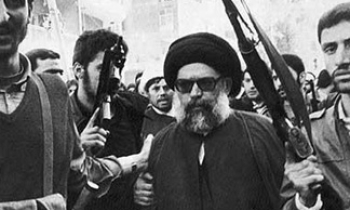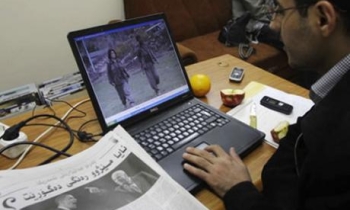The Committee to Protect Journalists (CPJ) has expressed alarm at the failure of the Pakistani authorities to respond to inquiries about the fate of journalist Hayatullah Khan more than a month after he was seized by unidentified gunmen in the North Waziristan tribal region bordering Afghanistan.
 WHO DUNNIT AGAIN: Pakistani tribal elders attend Jirga or a traditional meeting with government officials in Miran Shah, capital of Pakistan tribal area of North Waziristan along the Afghanistan border, Sunday, January 8, 2006. A senior Pakistan army official said the government still does not know who perpetrated an attack a day earlier that killed eight people in a tribal region and was blamed on US helicopters by local leaders even though the army has thousands of troops deployed in the region. (Associated Press/Abdullah Noor)
WHO DUNNIT AGAIN: Pakistani tribal elders attend Jirga or a traditional meeting with government officials in Miran Shah, capital of Pakistan tribal area of North Waziristan along the Afghanistan border, Sunday, January 8, 2006. A senior Pakistan army official said the government still does not know who perpetrated an attack a day earlier that killed eight people in a tribal region and was blamed on US helicopters by local leaders even though the army has thousands of troops deployed in the region. (Associated Press/Abdullah Noor)Family and colleagues have had no word of Khan since his abduction on December 5 last. Some colleagues suspect he was detained by the authorities after contradicting a government report on the killing of an Al-Qaeda commander. Requests to the authorities for information about Khan’s whereabouts by relatives, local journalist associations and international groups, including CPJ, have yielded nothing.
"We call on Pakistan’s President Pervez Musharraf to clarify whether the authorities are holding Hayatullah Khan," CPJ Executive Director Ann Cooper said. "Hayatullah Khan must be found swiftly and returned to his family. The government’s unresponsiveness more than one month after his abduction endangers both Khan and other journalists working in the region."
Khan reported on a December 1 explosion in the town of Haisori in North Waziristan which Pakistani authorities claim killed Abu Hamza Rabia, a senior Al-Qaeda commander. Khan, who worked for the Urdu-language daily Ausaf, contradicted the authorities’ report that Rabia died when munitions exploded inside a house.
He quoted local tribesmen as saying the house was hit by a missile fired from an aircraft. US media said the blast was caused by a US Hellfire missile fired from an unmanned Predator aircraft. Khan photographed fragments of the missile for the European Pressphoto Agency (EPA).
According to CPJ research, Khan had received numerous threats from security forces, alleged Taliban members, and local tribesman because of his reporting. His case is part of a disturbing pattern of targeted violence and intimidation against journalists working in the semiautonomous tribal areas. The Pakistani army has been battling militants in the area since the US-led invasion of Afghanistan in 2001 ousted the Taliban government and forced its supporters across the border.
Meanwhile, according to a Daily Times report, the Tribal Union of Journalists (TUJ) on Friday expressed "no confidence" in the federal government’s ability to ensure the security of journalists in the Federally Administered Tribal Areas (FATA), and appealed to international media rights groups to help them (tribal journalists) arrange for a "temporary shelter" in a third country.
Sailab Mehsud, TUJ president, told Daily Times that tribal journalists faced a "dangerous situation" and had been pushed to seek shelter in a third country following the killing of two journalists in Wana on February 7 and kidnapping of Hayatullah Khan.
 READY FOR A BLAST: Pakistani paramilitary soldiers with an armoured personal carrier guard a street in Miranshah, the main town in Pakistan's northern Waziristan tribal area January 7, 2006. Sixteen people, including eight paramilitary soldiers, were killed in the area on Saturday in separate incidents in its restive tribal belt on the afghan border, officials and witnesses said. (Reuters/Stringer)
READY FOR A BLAST: Pakistani paramilitary soldiers with an armoured personal carrier guard a street in Miranshah, the main town in Pakistan's northern Waziristan tribal area January 7, 2006. Sixteen people, including eight paramilitary soldiers, were killed in the area on Saturday in separate incidents in its restive tribal belt on the afghan border, officials and witnesses said. (Reuters/Stringer)He said more than a dozen tribal journalists had left South Waziristan Agency and settled in other cities after threats and bomb blasts. "It is surprising that the government is not heeding the TUJ’s concerns. Its indifference has forced us to seek the help of international media rights groups such as Reporters Without Borders," a TUJ statement, released after a meeting in Peshawar. The meeting also expressed concern over the government’s failure to recover Hayatullah Khan. "The meeting has decided that if Hayatullah Khan is not recovered by January 11, TUJ will hold a hunger-strike unto death in Peshawar and Islamabad," the statement said.
Information Minister Sheikh Rashid, however, told another story to the Daily Times. "The journalist’s family has asked the government not to pressure the kidnappers," he said. But the missing journalist’s family rejected the minister’s assertion, calling them a "bundle of lies". "There is no truth in the government’s claim. We are dying for Hayatullah. How can we ask the government not to stay make efforts for his release," a female family member of Hayatullah questioned.
Sheikh Rashid denied the government’s involvement in Hayatullah Khan’s kidnapping. "Why should we kidnap him," he asked. The TUJ meeting also appealed to national journalist organisations to stand by tribal journalists in "this hour of need, as they are in dire need of everyone’s support". It went on to add: "If tribal journalists are not supported, journalism will vanish from the tribal areas." Separately, the journalist community condemned the Khyber Agency administration for disallowing them on Thursday to cover a developing story on the confrontation between two groups in Bara tehsil. The issue was also raised during Sheikh Rashid’s press conference and the information minister promised to bring it to President Pervez Musharraf’s notice.









